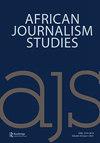自然灾害还是犯罪?主流媒体与Facebook在环境犯罪责任话语删除中的斗争
IF 1.8
3区 文学
Q3 COMMUNICATION
引用次数: 2
摘要
新闻媒体对环境犯罪的关注度各不相同;通常,它被用于无争议的犯罪和理想的受害者。许多环境危害是由对主流媒体有影响力的强大罪犯造成的,这一事实使这种偏见更加恶化。然而,尽管社交媒体有能力挑战主流事实,但这两个相互竞争的渠道对环境犯罪报道的关系尚未进行深入研究。本文分析了主流媒体与Facebook关于环境犯罪刑事责任话语删除的争论。为了提供经验证据,本文以预审前媒体对突发性堤防大坝的报道为例进行了研究。通过批判性话语分析,该研究考察了重新语境化,这是一种通过用自然灾害的语言报道环境犯罪来删除环境犯罪的策略。该方法用于比较肯尼亚三家主要报纸与Facebook评论中的反对派阅读。研究结果显示,Facebook有能力在肯尼亚充当一个表达不同声音的网站,并指控报纸优先报道精英阶层的言论,而这些言论可能掩盖环境犯罪。本文章由计算机程序翻译,如有差异,请以英文原文为准。
Natural Disaster or Crime? The Struggle between Mainstream Media and Facebook in Discursive Deletion of Responsibility from Environmental Crimes
ABSTRACT The news media attention to environmental crime varies; often, it is given to non-contested crimes with ideal victims. This bias is worsened by the fact that many environmental harms are committed by powerful offenders with influence over the mainstream media. Yet despite the ability of social media to contest mainstream truths, in-depth study has not been done in relation to environmental crime reporting by the two competing channels. This article analyses the contest between mainstream media and Facebook over discursive deletion of criminal responsibility for environmental crimes. To provide empirical evidence, pre-trial media coverage of a burst embankment dam is used as a case study. Through Critical Discourse Analysis, the study examines recontextualisation, a strategy for deleting environmental crimes by reporting them in the language of natural disasters. The approach is used to compare three leading newspapers in Kenya with the oppositional reading from Facebook comments. The findings demonstrate the ability of Facebook to act as a site for alternative voices in Kenya and indicts the newspapers for prioritising elite discourse that can obscure environmental crimes.
求助全文
通过发布文献求助,成功后即可免费获取论文全文。
去求助
来源期刊

African Journalism Studies
COMMUNICATION-
CiteScore
1.90
自引率
10.00%
发文量
18
期刊介绍:
Accredited by the South African Department of Higher Education and Training for university research purposes African Journalism Studies subscribes to the Code of Best Practice for Peer Reviewed Scholarly Journals of the Academy of Science of South Africa. African Journalism Studies ( AJS) aims to contribute to the ongoing extension of the theories, methodologies and empirical data to under-researched areas of knowledge production, through its emphasis on African journalism studies within a broader, comparative perspective of the Global South. AJS strives for theoretical diversity and methodological inclusivity, by developing theoretical approaches and making critical interventions in global scholarly debates. The journal''s comparative and interdisciplinary approach is informed by the related fields of cultural and media studies, communication studies, African studies, politics, and sociology. The field of journalism studies is understood broadly, as including the practices, norms, value systems, frameworks of representation, audiences, platforms, industries, theories and power relations that relate to the production, consumption and study of journalism. A wide definition of journalism is used, which extends beyond news and current affairs to include digital and social media, documentary film and narrative non-fiction.
 求助内容:
求助内容: 应助结果提醒方式:
应助结果提醒方式:


